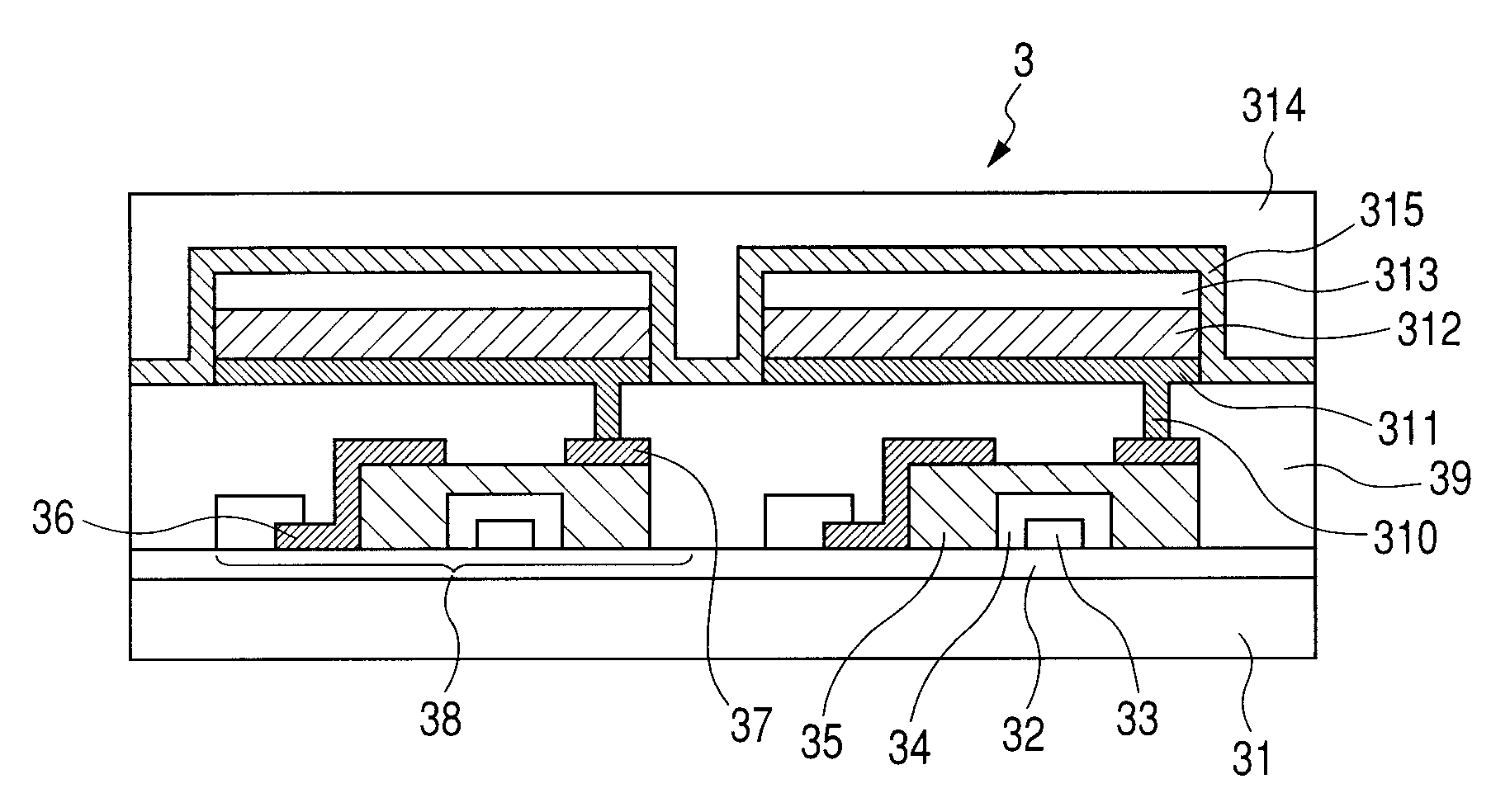Novel chrysene compound and organic light-emitting device having the compound
- Summary
- Abstract
- Description
- Claims
- Application Information
AI Technical Summary
Benefits of technology
Problems solved by technology
Method used
Image
Examples
example 1
Synthesis of Exemplified Compound C101
(1) Synthesis of 2-chlorochrysene
[0132]
[0133]First, 1-formylnaphthalen-2-yl-trifluoromethanesulfonic acid was synthesized from 2-hydroxy-1-naphthaldehyde. In addition, 4-chloro-2-formylphenylboronic acid was synthesized from 2-bromo-5-chlorobenzaldehyde.
[0134]The following reagents and solvents were placed in a 300-mL three-necked flask.
1-formylnaphthalen-2-yl-9.97 g(32.8 mmol)trifluoromethanesulfonic acid:4-chloro-2-formylphenylboronic acid:5.75 g(31.2 mmol)Tetrakis(triphenylphosphine)palladium(0):1.0 g(0.86 mmol)Toluene:100mLEthanol:50mL10-wt % aqueous solution of sodium50mLcarbonate:
[0135]The reaction solution was heated under reflux for 3 hours under nitrogen with stirring. After the completion of the reaction, the reaction solution was washed with water and dried over sodium sulfate. Then, the dried product was concentrated. Thus, a crude product was obtained. Next, the crude product was purified by silica gel column chromatography (eluent:...
example 2
Synthesis of Exemplified Compound C103
[0160]
[0161]The following reagents and solvents were placed in a 100-mL recovery flask.
6,12-dibromo-2-chlorochrysene:400 mg(0.95 mmol)Boronic Acid Compound BO-06:1.01 g(3.14 mmol)Palladium(II) acetate:22 mg(98 μmol)Dicyclohexyl(2′,6′-dimethoxybiphenyl-98 mg(239 μmol)2-yl)phosphine:Potassium phosphate:606 mg(2.85 mmol)Toluene:30mLWater:0.75mL
[0162]The reaction solution was heated at 100° C. for 33 hours under nitrogen with stirring. After the completion of the reaction, the reaction solution was washed with water and dried over sodium sulfate. Then, the dried product was concentrated. Thus, a crude product was obtained. Next, the crude product was purified by silica gel column chromatography (eluent:heptane / toluene=3 / 1). After that, the solution was further recrystallized with a mixed solvent of toluene and heptane. The resultant crystal was vacuum-dried at 150° C., and was then subjected to sublimation purification under conditions of 10−4 Pa an...
example 3
Synthesis of Exemplified Compound C107
[0169]
[0170]The following reagents and solvents were placed in a 200-mL recovery flask.
Intermediate Cl-204:1.60 g(3.11 mmol)Boronic Acid Compound BO-06:1.05 g(3.26 mmol)Palladium(II) acetate:42 mg(186 μmol)Dicyclohexyl(2′,6′-dimethoxybiphenyl-191 mg(466 μmol)2-yl)phosphine:Potassium phosphate:1.98 g(9.32 mmol)Toluene:80mLWater:2mL
[0171]The reaction solution was heated at 100° C. for 5 hours under nitrogen with stirring. After the completion of the reaction, the reaction solution was washed with water and dried over sodium sulfate. Then, the dried product was concentrated. Thus, a crude product was obtained. Next, the crude product was purified by silica gel column chromatography (eluent:heptane / chloroform=3 / 1). After that, the solution was further recrystallized with a mixed solvent of toluene and octane. The resultant crystal was vacuum-dried at 150° C., and was then subjected to sublimation purification under conditions of 10−4 Pa and 370° C. ...
PUM
| Property | Measurement | Unit |
|---|---|---|
| Volume | aaaaa | aaaaa |
| Volume | aaaaa | aaaaa |
| Volume | aaaaa | aaaaa |
Abstract
Description
Claims
Application Information
 Login to View More
Login to View More - R&D
- Intellectual Property
- Life Sciences
- Materials
- Tech Scout
- Unparalleled Data Quality
- Higher Quality Content
- 60% Fewer Hallucinations
Browse by: Latest US Patents, China's latest patents, Technical Efficacy Thesaurus, Application Domain, Technology Topic, Popular Technical Reports.
© 2025 PatSnap. All rights reserved.Legal|Privacy policy|Modern Slavery Act Transparency Statement|Sitemap|About US| Contact US: help@patsnap.com



